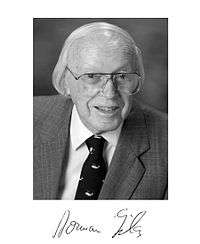Norman Giles
Norman Henry Giles (August 6, 1915 – October 16, 2006) was an American microbial geneticist who studied mutations of Neurospora crassa.
Norman Henry Giles | |
|---|---|
 Norman H. Giles | |
| Born | August 6, 1915 Atlanta, Georgia |
| Died | October 16, 2006 (aged 91) |
| Alma mater | Emory University (BA), Harvard University (PhD) |
| Known for | mutations of Neurospora crassa |
| Scientific career | |
| Fields | Microbial Genetics |
| Institutions | Yale University, University of Georgia |
Notable papers
- 1940: "The effects of fast neutrons on the chromosomes of Tradescantia". Proc. Natl. Acad. Sci. U. S. A. 26:567-575.
- 1948: With E. Z. Lederberg, "Induced reversions of biochemical mutants in Neurospora crassa". Am. J. Bot. 35:150-157.
- 1950: With H. P. Riley, "Studies on the mechanism of oxygen effect on the radiosensitivity of Tradescantia chromosomes". Proc. Natl. Acad. Sci. U. S. A. 36:337-344.
- 1950: With A. V. Beatty, "The effect of x-irradiation in oxygen and in hydrogen at normal and positive pressures on chromosome aberration frequency in Tradescantia microspores". Science 112:643-645.
- 1951: "Studies on the mechanism of reversion in biochemical mutants of Neurospora crassa". Cold Spring Harb. Sym. 16:283-313.
- 1956: "Forward and back mutation at specific loci in Neurospora". Brookhaven Sym. Biol. 8:103-125.
- 1957: With C. W. H. Partridge and N. J. Nelson, "The genetic control of adenylosuccinase in Neurospora crassa". Proc. Natl. Acad. Sci. U. S. A. 43:305-317.
- 1957: With E. H. Y. Chu, "A study of primate chromosome complements". Am. Nat. 91:273-282.
- 1958: With M. E. Case, "Evidence from tetrad analyses for both normal and aberrant recombination between allelic mutants in Neurospora crassa". Proc. Natl. Acad. Sci. U. S. A. 44:378-390.
Footnotes
gollark: Emotions are weird heuristics which maybe made sense in the past.
gollark: https://phineasandferb.fandom.com/wiki/Disney%27s_Phineas_and_Ferb:_The_Best_LIVE_Tour_Ever!/Transcript
gollark: Yes. I actually know about all circumstances simultaneously.
gollark: As planned.
gollark: Well, I dislike some of your actions even given circumstances, see.
References
- Biographical Memoirs: V. 91, the National Academies Press, Washington, D.C., 2009, pp. 136–151. (also available at http://www.genetics.uga.edu/pdf/giles_NAS_obit.pdf)
This article is issued from Wikipedia. The text is licensed under Creative Commons - Attribution - Sharealike. Additional terms may apply for the media files.